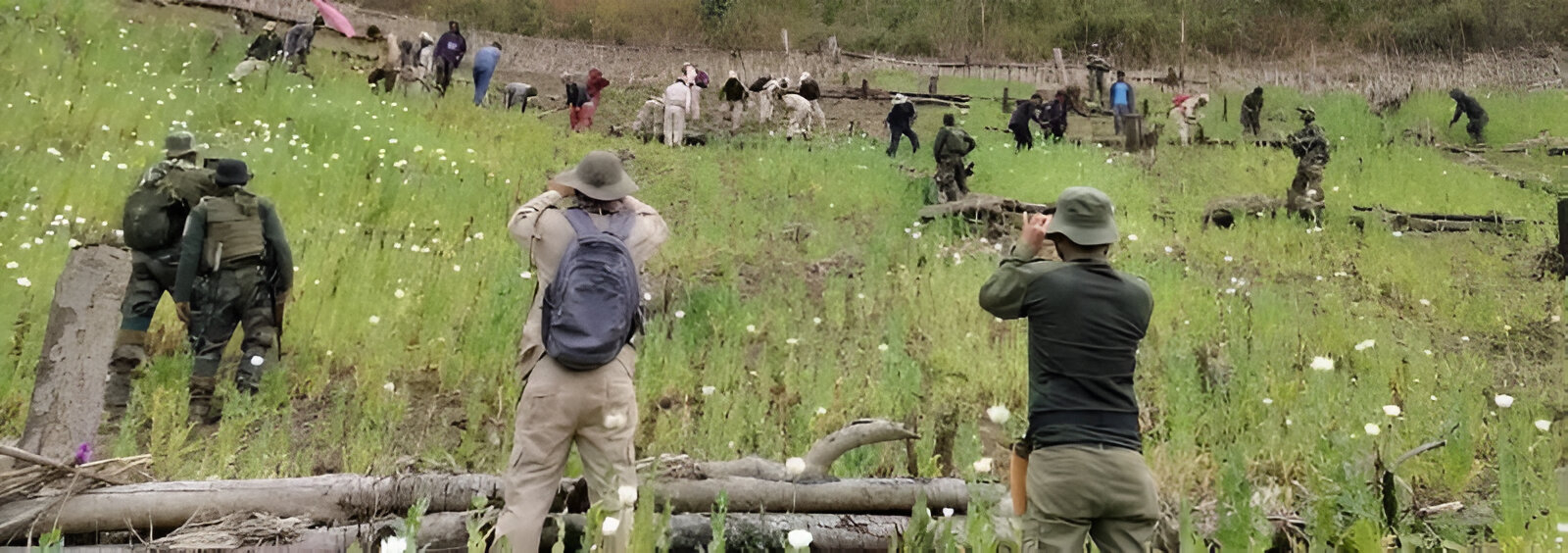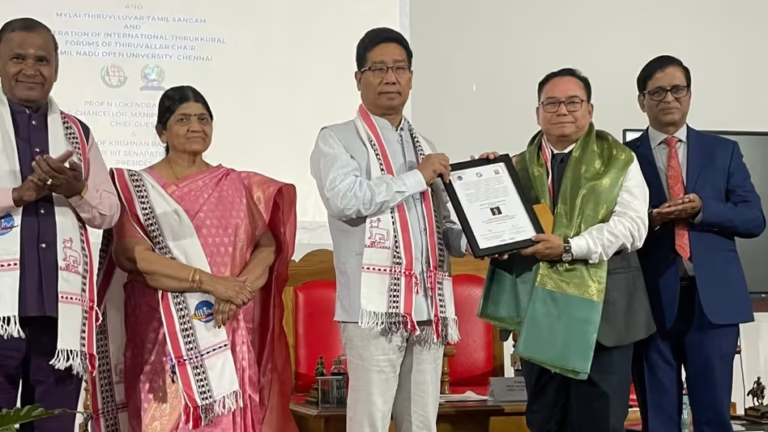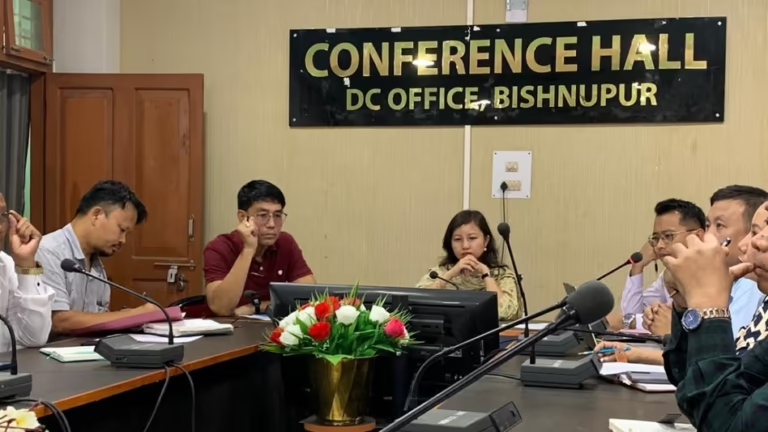Manipur Kuki Zo Villagers and Security Forces Join Hands to Eradicate Illegal Poppy Cultivation: A Landmark Achievement for Community Safety and Sustainable Development
Short Summary
In a significant breakthrough for community safety and sustainable development, Manipur’s Kuki Zo villagers, in close collaboration with security forces, have successfully eradicated illegal poppy cultivation in the region. This commendable initiative not only curbs illicit drug production but also marks a progressive step toward restoring social order and encouraging eco-friendly, alternative livelihoods in the area.
In-Depth Article: A Community United Against Illicit Poppy Cultivation
Introduction
Have you ever wondered how a community can transform challenges into triumphs? In Manipur, a remarkable story is unfolding—a story where the resilient spirit of the Kuki Zo villagers, combined with the strategic efforts of security forces, has led to the eradication of illegal poppy cultivation. Imagine a picturesque region, steeped in rich traditions, where the community decides to stand up against an issue that not only threatens their socio-economic well-being but also tarnishes their cultural heritage. This initiative is a shining example of what happens when people come together to reclaim their land and secure a better future.
In this article, we’re going to explore every facet of this inspiring development. We’ll dive into the historical context of poppy cultivation in the region, the active role played by the villagers and security forces, and the broader implications for sustainable development and community resilience. Grab a cup of tea, and let’s embark on this journey of discovery, understanding how unity and determination can spark profound change.
Historical Context and the Issue at Hand
To truly appreciate this achievement, it’s essential to understand the roots of the problem. For years, parts of Manipur have been marred by the illicit cultivation of poppy—a crop notorious for its role in the production of narcotics. Poppy cultivation, often driven by economic hardship and limited alternatives, has long posed challenges to law enforcement and community welfare alike.
- Economic Hardships: Many farmers resorted to growing poppy as it promised a quicker return compared to traditional crops. However, the short-term financial gains came at a long-term societal cost.
- Social Disruption: The spread of poppy cultivation has not only fueled the illegal drug trade but has also contributed to social unrest, creating a cycle of dependency and lawlessness in affected communities.
- Environmental Impact: Aside from the social and legal consequences, the cultivation of poppy can also have adverse effects on the environment, disrupting local ecosystems and depleting the natural resources that communities rely on.
Understanding this context makes the recent eradication effort all the more impressive. It’s not just about removing a harmful crop—it’s about restoring hope, reviving traditional agriculture, and ensuring that future generations inherit a safer, more prosperous land.
The Role of the Kuki Zo Villagers
At the heart of this transformative initiative are the Kuki Zo villagers. Known for their strong community ties and deep-rooted cultural values, these villagers have taken a proactive stance in reclaiming their land from the grips of illegal poppy cultivation.
- Community Mobilization: The villagers organized themselves, creating awareness and rallying support from within the community. Their determination was fueled by a desire to protect their families, preserve their traditions, and promote sustainable farming practices.
- Traditional Knowledge Meets Modern Solutions: The Kuki Zo people have a long history of agricultural expertise. By integrating their traditional methods with modern sustainable practices, they have paved the way for a transition from illicit poppy cultivation to environmentally friendly and economically viable alternatives.
- Grassroots Leadership: Local leaders played a crucial role in bridging the gap between the community and law enforcement. Their ability to communicate effectively, empathize with the struggles of their people, and inspire collective action was instrumental in achieving this milestone.
Imagine the sense of pride and empowerment when a community takes charge of its destiny. This initiative is a testament to how grassroots movements, when led by passionate and knowledgeable individuals, can overcome deeply entrenched problems.
Security Forces: A Partner in Progress
While the villagers provided the drive and local insight, the support from security forces was indispensable in executing the eradication plan. The collaborative efforts between the community and law enforcement created a robust framework to dismantle the illegal operations that had long taken root in the area.
- Coordinated Operations: The security forces conducted well-planned raids and surveillance operations, working in tandem with local informants and community leaders. Their strategic planning ensured that operations were conducted efficiently and safely.
- Respect for Local Culture: Importantly, the security forces approached the task with sensitivity to local customs and traditions. This respect fostered trust and cooperation, making it easier to engage with the community rather than imposing an external force.
- Capacity Building and Training: In some cases, security personnel received training on cultural sensitivity and community engagement. This investment in building better relations paid dividends in ensuring that operations were seen as a collaborative effort rather than a top-down imposition.
- Long-Term Commitment: The eradication of illegal poppy cultivation is not a one-time event but a sustained effort. The security forces have shown their commitment to continuous monitoring and support to prevent any resurgence of the illicit crop.
The synergy between the community and the security forces is a perfect example of how partnerships built on mutual respect and common goals can lead to transformative change. When law enforcement works with the people rather than against them, the results speak for themselves.
Transforming the Landscape: Social and Economic Implications
The eradication of illegal poppy cultivation in Manipur carries significant social and economic implications that extend well beyond the immediate removal of an illicit crop. This initiative is a stepping stone toward a more stable, prosperous, and healthy community.
- Economic Revitalization: With the removal of the poppy crop, there is now an opportunity for farmers to shift to legal and sustainable alternatives. The region can benefit from the introduction of high-value crops, organic farming, and agroforestry, which are more in tune with global market trends.
- Social Stability: By cutting off a major source of illicit revenue, the initiative helps in reducing associated criminal activities. This, in turn, creates a safer environment for children, women, and the elderly, fostering community cohesion.
- Improved Health and Education: Resources previously diverted to combat the negative effects of poppy cultivation can now be redirected toward improving public health, education, and infrastructure. Healthier communities are better equipped to pursue economic opportunities and lead fulfilling lives.
- Environmental Benefits: Transitioning to sustainable agriculture also means protecting the local ecosystem. Traditional crops and organic farming methods help preserve soil fertility, conserve water, and maintain biodiversity, ensuring that the environment remains resilient for future generations.
Think of it as a domino effect—one positive change can trigger a cascade of benefits. The eradication of illegal poppy cultivation is setting off a series of events that will ultimately lead to a more vibrant and secure community.
Alternative Livelihoods and Sustainable Agriculture
One of the key challenges in eradicating an illicit crop like poppy is offering viable alternatives for the affected farmers. The success of this initiative hinges on the ability to provide sustainable, economically rewarding substitutes that align with local conditions and expertise.
- Introducing High-Value Crops: Agricultural experts and government agencies are working together to identify crops that are both lucrative and well-suited to the region’s climate. These include medicinal plants, fruits, vegetables, and spices that have a growing demand in domestic and international markets.
- Organic Farming Practices: The shift to organic farming not only caters to the global trend of healthy eating but also ensures that the methods employed are environmentally sustainable. Organic practices can help improve soil health, reduce the dependency on chemical inputs, and promote biodiversity.
- Agroforestry Initiatives: Integrating trees with crop farming can yield multiple benefits, including enhanced soil fertility, carbon sequestration, and diversified income streams for farmers. Agroforestry is an ideal model for regions like Manipur, where traditional agricultural practices have long coexisted with forest ecosystems.
- Skill Development and Training: For the transition to be successful, farmers need access to training and resources. Workshops, extension services, and community training programs are being organized to equip local farmers with the knowledge and skills required for sustainable agriculture.
- Microfinance and Government Support: Financial institutions and government bodies are playing a crucial role in facilitating this transition by providing low-interest loans, subsidies, and technical assistance. Such measures ensure that farmers can invest in new techniques without facing crippling financial burdens.
By offering these alternatives, the initiative not only eradicates a problematic crop but also lays the foundation for long-term economic growth and environmental sustainability. It’s like planting a seed that will eventually blossom into a healthy, thriving ecosystem.
Challenges and the Road Ahead
No transformative journey is without its challenges. While the eradication of illegal poppy cultivation is a monumental achievement, the road ahead is filled with tasks that require continued vigilance and adaptive strategies.
- Ensuring Long-Term Sustainability: It’s one thing to remove an illicit crop; it’s another to ensure that it doesn’t return. Long-term monitoring and support systems are essential to prevent any relapse into old practices.
- Community Buy-In: For any initiative to succeed, continuous community engagement is crucial. Maintaining the momentum of change requires ongoing dialogue, support, and a shared vision for the future.
- Balancing Enforcement with Support: Law enforcement must continue to work hand-in-hand with community leaders to strike the right balance between strict regulation and offering supportive alternatives.
- Economic Fluctuations: Transitioning to new crops and farming methods may not yield immediate results. Farmers might face temporary economic setbacks before the benefits of sustainable agriculture become apparent.
- Adapting to Changing Conditions: Climate change and other unforeseen environmental factors could impact new agricultural practices. It’s important for local authorities, researchers, and farmers to remain flexible and responsive to these changes.
While these challenges are significant, they are by no means insurmountable. With the continued cooperation of villagers, security forces, government agencies, and agricultural experts, Manipur can set an example for how communities can triumph over adversity.
Community Resilience and the Spirit of Togetherness
One of the most inspiring aspects of this story is the indomitable spirit of the community. The Kuki Zo villagers have shown that when people unite for a common cause, they can overcome even the most entrenched challenges. Their resilience is a beacon of hope, reminding us that progress is born out of unity and shared determination.
- Cultural Pride and Identity: The decision to eradicate poppy cultivation is deeply tied to preserving cultural identity. For many villagers, the land is not just a means of livelihood but also a repository of heritage and tradition.
- Empowerment Through Action: The active involvement of local leaders and community members has empowered individuals to take charge of their destiny. This collective action is a testament to the power of grassroots movements in creating sustainable change.
- Creating a Legacy: The success of this initiative will be remembered as a turning point in the region’s history. It serves as a powerful reminder to future generations that they have the strength and ingenuity to tackle even the most daunting issues.
Imagine a community where every individual feels a sense of ownership over their future—a community where every small victory contributes to a larger, shared success story. That is the vision that is slowly becoming a reality in Manipur.
Government and Policy Support
Behind the scenes of such transformative initiatives, supportive government policies and frameworks play a pivotal role. Local authorities and policy makers are increasingly recognizing the need to shift focus from punitive measures to inclusive development.
- Policy Reforms: Recent policy changes aimed at promoting sustainable agriculture and curbing illicit crop cultivation have provided a strong backbone for the initiative. These reforms include better regulatory frameworks and incentives for farmers transitioning to legal crops.
- Inter-Agency Collaboration: Successful implementation has required the collaboration of various government agencies—ranging from law enforcement to agricultural departments—ensuring a coordinated approach to tackling the issue.
- Incentive Programs: Financial incentives, including subsidies and low-interest loans, have been critical in encouraging farmers to shift away from poppy cultivation. Such support helps mitigate the risks associated with transitioning to new agricultural practices.
- Awareness Campaigns: The government has also supported awareness campaigns that educate farmers on the dangers of illegal poppy cultivation and the benefits of sustainable alternatives. These campaigns are vital in creating long-lasting change and fostering a culture of compliance and sustainability.
When government support aligns with local aspirations, it creates an environment where positive change can flourish. This initiative is a stellar example of how robust policy measures can reinforce community-led efforts.
The Broader Impact on Northeast India
The significance of this eradication effort extends far beyond Manipur. It sends a powerful message to the entire Northeast region of India and even to other parts of the country facing similar challenges.
- A Model for Replication: The collaboration between the community and security forces in Manipur can serve as a model for other regions grappling with illegal cultivation and associated criminal activities.
- Strengthening Regional Identity: Initiatives like these contribute to a stronger regional identity and a sense of pride among the diverse communities of Northeast India. They highlight the potential for sustainable development and the preservation of cultural heritage.
- Economic Ripple Effects: By shifting from illicit crops to sustainable agriculture, there is potential for broader economic benefits that could uplift entire communities. This success story may encourage investments in infrastructure, education, and health in the region.
- Inspiring National Dialogue: The eradication of illegal poppy cultivation in Manipur has sparked discussions on drug control, sustainable farming, and community policing at national forums. These conversations are crucial in shaping future policies and development strategies.
This achievement is not just a local victory—it’s an inspiring chapter in the narrative of Northeast India’s journey toward progress and prosperity.
Reflections and the Road to a Brighter Future
As we reflect on this monumental achievement, it’s clear that the eradication of illegal poppy cultivation in Manipur is more than a singular event—it’s the beginning of a transformative journey. The combined efforts of the Kuki Zo villagers and security forces have laid a strong foundation for a future marked by sustainable development, social harmony, and economic growth.
- A New Chapter for Agriculture: With the removal of poppy, farmers now have the opportunity to embrace modern, sustainable agricultural practices that can yield long-term benefits. The shift to eco-friendly crops promises a healthier environment and improved living standards.
- Community Empowerment: The sense of empowerment felt by the villagers is palpable. They now have a renewed sense of purpose and a vision for the future that is deeply rooted in their cultural identity and a commitment to progress.
- Sustainable Development: This initiative serves as a reminder that true development is not measured solely by economic indicators but by the well-being and resilience of a community. When people work together to address local challenges, the ripple effects are felt across generations.
- Hope and Inspiration: Ultimately, this story is one of hope—a hope that even in the face of longstanding challenges, unity and determination can bring about lasting change. It’s a narrative that inspires not only those in Manipur but communities everywhere to believe in their capacity to overcome adversity.
As we look to the future, the lessons learned here will undoubtedly guide further initiatives in Manipur and beyond. The road ahead may be long, but with a strong community spirit and continued support from all stakeholders, the promise of a brighter, more sustainable tomorrow is well within reach.
FAQs
- What led to the eradication of illegal poppy cultivation in Manipur?
The eradication was achieved through a coordinated effort between Kuki Zo villagers and security forces, combining community mobilization, traditional knowledge, and modern enforcement strategies to replace illicit practices with sustainable alternatives. - How have the Kuki Zo villagers contributed to this initiative?
The villagers played a crucial role by organizing community awareness, adopting sustainable agricultural practices, and working closely with local leaders and law enforcement to reclaim their land from illegal activities. - What role did the security forces play in the operation?
Security forces conducted coordinated operations, maintained cultural sensitivity, and provided long-term monitoring to ensure that the eradication was successful and that illegal activities would not resume. - How will the shift away from poppy cultivation benefit the community?
The shift opens the door to sustainable agriculture, improved economic stability, reduced social unrest, and environmental benefits, ultimately leading to a healthier and more prosperous community. - What can other regions learn from Manipur’s experience?
Other regions can take inspiration from the collaborative approach between local communities and security forces, the importance of offering viable economic alternatives, and the power of grassroots movements in driving sustainable change.



